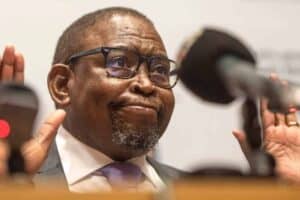South Africa must address inequality or face the consequences.

Since being dismissed as minister of finance Pravin Gordhan has been at pains to emphasise that South Africa’s problems go beyond one man. In the speeches he has delivered and press conferences he has given, he has not once singled out President Jacob Zuma for individual criticism.
Speaking at the memorial service for Rivonia Trialist Ahmed Kathrada in Cape Town on Thursday, Gordhan once again reiterated his belief that the entire thrust of the country’s politics needs to be addressed. Without ever saying so directly, he was making the point that simply removing Zuma is not going to resolve South Africa’s problems.
Specifically, Gordhan argued for more principled leadership.
“We celebrate Ahmed Kathrada for his principled politics because principled politics is what we all have to start believing in, or learning about, or becoming a lot more familiar with, because politicians and principles more often than not don’t go together anywhere in the world,” he said.
Gordhan said Kathrada’s example was one of public service, and the kinds of political leaders South Africa needs are those who are committed to being servants of the people, not those who see public office as a means to self-enrichment.
He added that leaders must work in the interests of the poor and marginalised in society.
“Democracies are not produced overnight,” Gordhan said. “Equality from the kind of gross inequality that we have had in our society won’t be produced overnight either. But if we remain united we can speed up the processes of history and reach that vision that the National Development Plans and the Freedom Charter have outlined for us, which is a South Africa where every single citizen enjoys social justice in every sense of that phrase.”
He said that Kathrada’s vision was that economic emancipation in South Africa would support a new form of social cohesion. Much however still needs to be done for this to become reality.
“In 1994 we won our political freedom, but that didn’t bring with it the necessary economic change,” Gordhan argued. “And so today we remain a hugely unequal society – probably the most unequal society in the world.”
The first ANC government had inherited two economies, and the disparity between the two had to be addressed.
“In most parts of the world, with the exception of Japan, South Korea and Singapore, it took countries like ours 30 years of 10% growth to overcome the kind of inequalities, joblessness and other economic difficulties we face,” Gordhan said. “We can’t wait 30 years. We might not get to 10% growth in the immediate term. But we have to find the most creative answers possible to make sure that those tens of millions of people who find themselves in the lower rungs of the socio-economic ladder are pulled up as quickly as possible.”
He argued that the consequences of not doing this are already starting to play out.
“Kathy would say in this kind of environment we have a crucial responsibility: Tend to the problems of inequality with a far greater urgency otherwise you will have a situation that we can see the beginnings of, which is the abuse of the plight of ordinary poor people through popular slogans for the benefit of the few,” said Gordhan. “That’s what’s going to happen.”
For this reason, the entire country has to take collective responsibility for bringing about the necessary change.
“Whilst radical economic transformation has become a useful populist slogan, there is a bit of truth in it,” Gordhan said. “Unless we are indeed transformative, and we are radical in the sense that we get to the roots of the problem, and radical in the sense that we lend a new sense of urgency to bring about economic change and greater levels of social justice, we won’t be solving South Africa’s problems, and nor are we going to be able to blame somebody else for those problems either.”
After 23 years of democracy, it is imperative that the country find a way to make its economy significantly more inclusive.
“Kathy would say to us that we have to transform the economy and get the benefits of that transformation spread amongst all 55 million people so that all 10 or 15 million households have some assets, can say that they control some wealth, have stopped communicating poverty from one generation to the next, and they themselves become the bearers of hope in our society together with the middle classes,” said Gordhan. “That is the aspiration we need to work towards.”
Brought to you by Moneyweb






